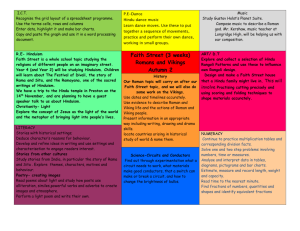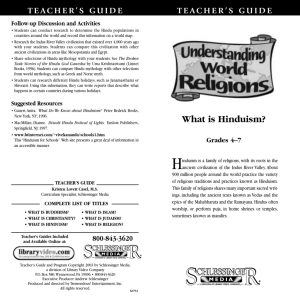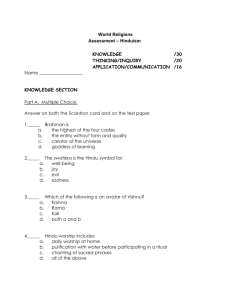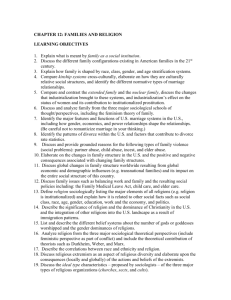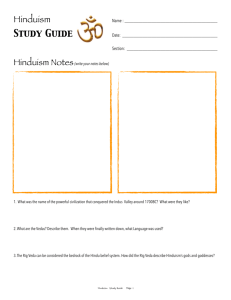Paper seeking views/suggestions from all concerned on Clause (c)
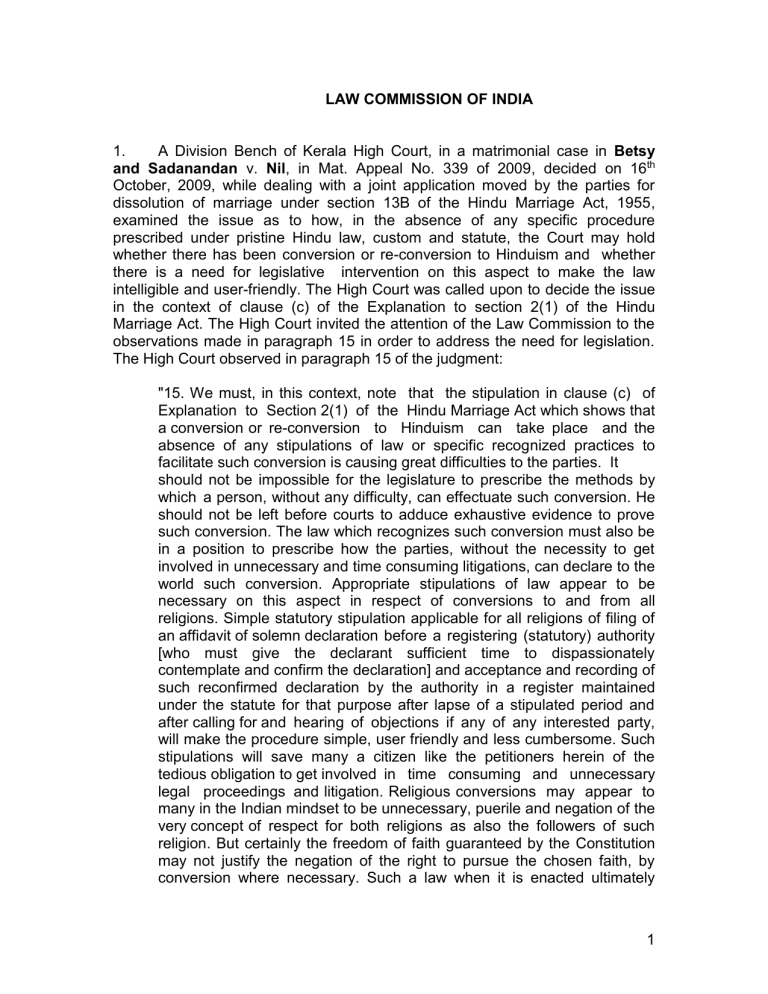
LAW COMMISSION OF INDIA
1. A Division Bench of Kerala High Court, in a matrimonial case in Betsy and Sadanandan v.
Nil , in Mat. Appeal No. 339 of 2009, decided on 16 th
October, 2009, while dealing with a joint application moved by the parties for dissolution of marriage under section 13B of the Hindu Marriage Act, 1955, examined the issue as to how, in the absence of any specific procedure prescribed under pristine Hindu law, custom and statute, the Court may hold whether there has been conversion or re-conversion to Hinduism and whether there is a need for legislative intervention on this aspect to make the law intelligible and user-friendly. The High Court was called upon to decide the issue in the context of clause (c) of the Explanation to section 2(1) of the Hindu
Marriage Act. The High Court invited the attention of the Law Commission to the observations made in paragraph 15 in order to address the need for legislation.
The High Court observed in paragraph 15 of the judgment:
"15. We must, in this context, note that the stipulation in clause (c) of
Explanation to Section 2(1) of the Hindu Marriage Act which shows that a conversion or re-conversion to Hinduism can take place and the absence of any stipulations of law or specific recognized practices to facilitate such conversion is causing great difficulties to the parties. It should not be impossible for the legislature to prescribe the methods by which a person, without any difficulty, can effectuate such conversion. He should not be left before courts to adduce exhaustive evidence to prove such conversion. The law which recognizes such conversion must also be in a position to prescribe how the parties, without the necessity to get involved in unnecessary and time consuming litigations, can declare to the world such conversion. Appropriate stipulations of law appear to be necessary on this aspect in respect of conversions to and from all religions. Simple statutory stipulation applicable for all religions of filing of an affidavit of solemn declaration before a registering (statutory) authority
[who must give the declarant sufficient time to dispassionately contemplate and confirm the declaration] and acceptance and recording of such reconfirmed declaration by the authority in a register maintained under the statute for that purpose after lapse of a stipulated period and after calling for and hearing of objections if any of any interested party, will make the procedure simple, user friendly and less cumbersome. Such stipulations will save many a citizen like the petitioners herein of the tedious obligation to get involved in time consuming and unnecessary legal proceedings and litigation. Religious conversions may appear to many in the Indian mindset to be unnecessary, puerile and negation of the very concept of respect for both religions as also the followers of such religion. But certainly the freedom of faith guaranteed by the Constitution may not justify the negation of the right to pursue the chosen faith, by conversion where necessary. Such a law when it is enacted ultimately
1
shall, we do hope, also respect the rights of the citizen in this secular country to declare that he belongs to no religion at all or that he does belong to humanity with no walls of religion to segregate him from any other.
”
2. Prima facie , the Law Commission is not In favour of disturbing the existing state of law as laid down in a series of court-decisions as regards the essential elements of proof required to establish the plea of conversion/re-conversion.
However, the Law Commission feels that it would be proper to implement the suggestion of the High Court to a limited extent by providing that the convert/reconvert should be given an option to file a declaration before the concerned Registrar of Marriages with the prescribed particulars so that it could serve as a piece of evidence among others in resolving the issue - as and when a future controversy arises. This would, to some extent, address the concerns expressed by the Court.
3. In view of the above, the Law Commission seeks views/suggestions from all concerned. The same may be sent to the Office of the Law Commission by post or e-mailed at lci-dla@nic.in
before 20 th August 2010.
2
